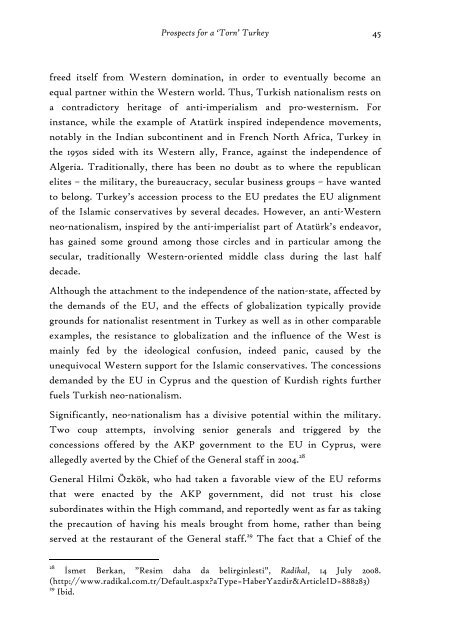2008_10_SRP_CornellKaraveli_Turkey
2008_10_SRP_CornellKaraveli_Turkey
2008_10_SRP_CornellKaraveli_Turkey
You also want an ePaper? Increase the reach of your titles
YUMPU automatically turns print PDFs into web optimized ePapers that Google loves.
Prospects for a ‘Torn’ <strong>Turkey</strong> 45<br />
freed itself from Western domination, in order to eventually become an<br />
equal partner within the Western world. Thus, Turkish nationalism rests on<br />
a contradictory heritage of anti-imperialism and pro-westernism. For<br />
instance, while the example of Atatürk inspired independence movements,<br />
notably in the Indian subcontinent and in French North Africa, <strong>Turkey</strong> in<br />
the 1950s sided with its Western ally, France, against the independence of<br />
Algeria. Traditionally, there has been no doubt as to where the republican<br />
elites – the military, the bureaucracy, secular business groups – have wanted<br />
to belong. <strong>Turkey</strong>’s accession process to the EU predates the EU alignment<br />
of the Islamic conservatives by several decades. However, an anti-Western<br />
neo-nationalism, inspired by the anti-imperialist part of Atatürk’s endeavor,<br />
has gained some ground among those circles and in particular among the<br />
secular, traditionally Western-oriented middle class during the last half<br />
decade.<br />
Although the attachment to the independence of the nation-state, affected by<br />
the demands of the EU, and the effects of globalization typically provide<br />
grounds for nationalist resentment in <strong>Turkey</strong> as well as in other comparable<br />
examples, the resistance to globalization and the influence of the West is<br />
mainly fed by the ideological confusion, indeed panic, caused by the<br />
unequivocal Western support for the Islamic conservatives. The concessions<br />
demanded by the EU in Cyprus and the question of Kurdish rights further<br />
fuels Turkish neo-nationalism.<br />
Significantly, neo-nationalism has a divisive potential within the military.<br />
Two coup attempts, involving senior generals and triggered by the<br />
concessions offered by the AKP government to the EU in Cyprus, were<br />
allegedly averted by the Chief of the General staff in 2004. 28<br />
General Hilmi Özkök, who had taken a favorable view of the EU reforms<br />
that were enacted by the AKP government, did not trust his close<br />
subordinates within the High command, and reportedly went as far as taking<br />
the precaution of having his meals brought from home, rather than being<br />
served at the restaurant of the General staff. 29 The fact that a Chief of the<br />
28<br />
İsmet Berkan, ”Resim daha da belirginlesti”, Radikal, 14 July <strong>2008</strong>.<br />
(http://www.radikal.com.tr/Default.aspx?aType=HaberYazdir&ArticleID=888283)<br />
29 Ibid.


